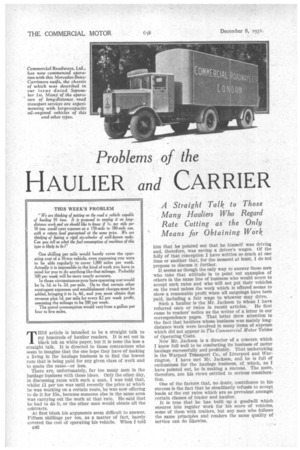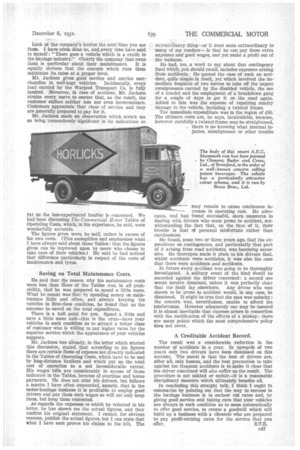Problems of the
Page 68

Page 69

If you've noticed an error in this article please click here to report it so we can fix it.
HAULIER and CARRIER
A Straight Talk to Those Many Hauliers Who Regard Rate Cutting as the Only Means for Obtaining WOrk
THIS article is intenaed to be a straight talk to ray hundreds of haulier readers. It is set out in black ink on white paper, but it is none the less a straight talk. It is directed to those contractors who seem to imagine that the one hope they have of making a living in the haulage business is to find the lowest rate that is being paid for any given class of work and to quote the same—or less.
There are, unfortunately, far too many men in the haulage business with those ideas. Only the other day, in discussing rates with such a man, I was told that, whilst fl per ton was until recently the price at which he was working on a certain route, he was now offering to do it for I5s., because someone else in the same area was carrying out the work at that rate. He said that he had to do it, or the other man would obtain all the cohtracts.
At first blush his arguments seem difficult to answer. Fifteen shillings per ton, as a matter of fact, barely covered the cost of operating his vehicle. When I told
c46 him that he pointed out that he himself was driving and, therefore, was saving a driver's wages. Of the folly of that conception I have written so much at one time or another that, for the moment at least, I do not propose to discuss it further.
It seems as though the only way to answer those men who take that attitude is to point out examples of others in the same line of business who would scorn to accept such rates and who will not put their vehicles on the road unless the work which is offered seems to show a reasonable profit when all outgoings have been paid, including a fair wage to whoever may drive.
Such a haulier is the Mr. Jackson to whom I have
referred once or twice in recent articles. He first came to readers' notice as the writer of a letter in our correspondence pages. That letter drew attention to the fact that hauliers whose business was mainly longdistance work were involved in many items of expense which did not appear in The Commercial Motor Tables of Operating Cos. Now Mr. Jackson is a director of a concern which I know full well to be conducting its business of motor haulage successfully and profitably. That undertaking is the Warpool Transport Co., of Liverpool and Warrington. I have met Mr. Jackson, and he is full of enthusiasm for the haulage business, of which, as I have pointed out, he is making a success. The more, therefore, are his views entitled to serious consideration.
One of the factors that, no doubt, contributes to his success is the fact that he steadfastly refuses to accept loads at the cut rates which are so prevalent amongst certain classes of trader and haulier.
It is true that he has built up a goodwill which ensures him regular work for his score of vehicles, some of them with trailers, hut any man who follows the same principles and renders the same quality of service can do likewise.
Look at the company's lorries the next time you see them. I have often done so, and every time have said to myself : "There goes a vehicle which is a credit to the haulage industry." Clearly the company that owns them is particular about their maintenance. It Is equally obvious that the concern which runs them maintains its rates at a proper level. Mr. Jackson gives good service and carries merchandise in well-kept vehicles. Incidentally, every load carried by the Warpool Transport Co. is fully insured. Moreover, in case of accident, Mr. Jackson strains every nerve to ensure that, as the result, the customer suffers neither loss nor even inconvenience. Customers appreciate that class of service and they are generally prepared to pay for it. Mr. Jackson made an observation which struck me as being tremendously significant in its indications so
far as the less-experienced haulier is concerned. We had been discussing The Commercial Motor Tables of Operating Costs, which, in his experience, he said, were wonderfully accurate.
The figures given were, he said, rather in excess of his own costs. (This exemplifies and emphasizes what I have always said about those Tables : that the figures given can be improved upon by users who choose to take care of their vehicles.) He said he had noticed that difference particularly in respect of the costs of maintenance and tyres.
Saving on Total Maintenance Costs.
He said that the reason why his maintenance costs were less than those of the Tables was, in all probability, that he was prepared to spend a little more. What he meant was that by spending money on maintenance little and often, and always keeping his vehicles in first-class condition, he found that as the outcome he saved on the total expenditure.
There is a bull point for you. Spend a little and save a little more and—this is the crux—have your vehicles in such condition as to attract a better class of customer who is willing to pay higher rates for the superior service which the appearance of your vehicles suggests.
Mr. Jackson has already, in the letter which started this discussion, stated that according to his figures there are certain items of expense not directly indicated in the Tables of Operating Costs, which have to be met by long-distance hauliers and which put up the total cost of operation to a not inconsiderable extent His wages bills are considerably in excess of those indicated in the Tables, because of overtime and bonus payments. He does not stint his drivers, but follows a maxim I have often expounded, namely, that in the motor-haulage business it is profitable to employ good drivers and pay them such wages as will not only keep them, but keep them contented. As regards the expenses to which he referred in his letter, he has shown me the actual figures, and they confirm his original statement. I cannot, for obvious reasons, publish the actual figures, but I can state that what I have seen proves his claims to the hilt. The extraerdinary thing—or it must seem extraordinary to many of my readers— is that he can pay these extra expenses and good wages, and yet make a profit out of the business.
He had, too, a word to say about that contingency fund which, you should recall, includes expenses arising from accidents. He quoted the case of such an accident, quite simple in itself, yet which involved the immediate despatch of two lorries to take off the urgent consignments carried by the disabled vehicle, the use of a tractor and the employment of a breakdown gang for a couple of days to get it on the road again. Added to this was the expense of repairing sundry damage to the vehicle, including a twisted frame.
The immediate expenditure was in the region of The ultimate costs are, he says, incalculable, because, however carefully a twisted frame may be straightened, there is no knowing what internal injuries, misalignment or other trouble – rnay remain to cause continuous increase in operating cost. He advocates, and has found successful, stern measures in dealing with drivers who seem prone to accident, notwithstanding the fact that, on the face of it, their trouble is that of personal misfortune rather than carelessness.
He found, some two or three years ago, that the expenditure on contingencies, and particularly that part• of it arising from road accidents, was becoming excessive. He thereupon made it plain to his drivers that, whilst accidents were accidents, it was also the case that there were accidents and accidents.
In future every accident was going to be thoroughly investigated. A, solitary event of the kind vnould be recorded against the driver concerned : a second one would, involve dismissal, unless it was perfectly clear that the fault lay elsewhere. Any driver who was shown to be prone 0 accident would, in any case, be dismissed. It might be true that the man was unlucky: the concern was, nevertheless, unable to afford his misfortunes. However adequately one may be insured it is almost inevitable that expense arises in connection with the rectification of the effects of a mishap ; there are many points which the most comprehensive policy does not cover.
A Creditable Accident Record.
The result was a considerable reduction in the number of accidents in a year. In upwards of two years only two drivers have been dismissed on this account. The moral is that the best of drivers are, after all, only human, and the best precaution to take against too frequent accidents is to make it dear that the driver concerned will also suffer as the result. The procedure is not unkind or unfair—it is a reasonable disciplinary measure which ultimately benefits all.
In concluding this straight talk, I think I ought to summarize by pointing out that the way to success in the haulage business is to eschew cut rates and, by giving good service and taking care that your vehicles are always in such condition as to seem automatically to offer good service, to create a goodwill which will build up a business with a clientele who are prepared to pay profit-earning rates for the service that you offer. S.T.R.














































































































